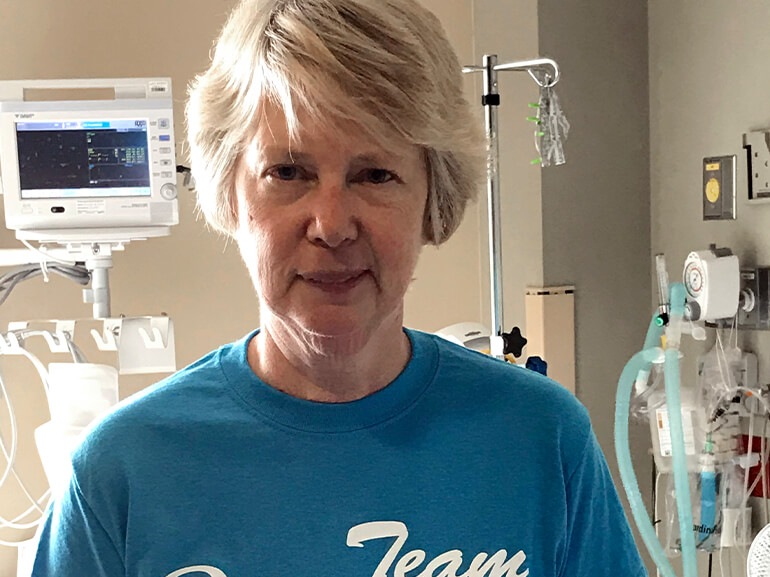Sharon's story

Triumphing over Guillian-Barre Syndrome
As a certified public accountant, Sharon Mortensen prides herself on attention to detail. In late February, just as tax season and COVID-19 was starting to emerge, she suddenly started feeling weak. Sharon knew this new development wasn’t normal. Neither was the sudden-onset double vision. She had someone drive her to the local emergency room, which transferred her to a larger regional medical center.
Doctors there diagnosed Guillian-Barre Syndrome, a rare disorder in which the immune system attacks healthy nerve cells. Sharon experienced a host of complications, including whole-body weakness, paralysis and respiratory failure. She was placed on a ventilator, airway support and a feeding tube.
After three weeks, Sharon stabilized and her family was able to evaluate next steps. They chose Regency Hospital Porter, a critical illness recovery hospital for its strong reputation in ventilator liberation, nutritional support and therapy services.
Sharon arrived in mid-March, unable to breathe, eat or speak.
Sharon wanted to get better so she could return home and care for her grandson.
A physician-led team, including nurses and therapists, created a plan to help Sharon regain her independence.
Respiratory therapists assessed Sharon’s breathing abilities, leading her through coughing and chest exercises. Gradually, they stepped down the breathing machine’s support.
At the same time, physical and occupational therapists began a progressive mobility program. Each day, Sharon tried to roll over, sit up in bed and at its edge. She grew a little stronger with each attempt. Next, therapists moved Sharon to a chair and assisted her with standing.
As COVID-19 continued to take hold, hospitals, including Regency, instituted a “no visitors” policy to protect patients and staff. Sharon said while it was difficult to not see her family, it helped her to become a strong self-advocate.
When she needed motivation, Sharon said the nurses and certified nursing assistants gave her just the boost she needed. Sharon became so confident in her skills, she continued exercises in bed after her daily therapy sessions.
“I remember when they downsized my trach. I was terrified and then when they took it out I was so scared. But, honestly, I could not have been in better hands,” she said.
By the end of March, Sharon passed a swallow study, indicating she could eat and drink without a risk of drawing material back into her lungs. Dietitians and speech therapists worked together to calibrate her meals with the proper mix of safe textures and nutritional value.
Sharon was thrilled when she took her first real shower the day before she was discharged. Proudly, she dressed herself and took laps in the hallway with a walker.
On April 1, Sharon departed for a week in a rehabilitation facility to help round off her skills. She’s looking forward to going home and spending time with her family.